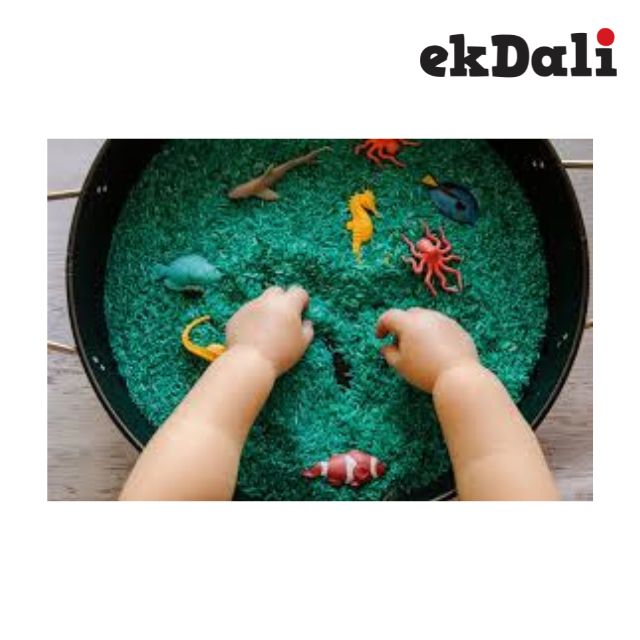Play that involves the senses of smell, taste, sight, touch, and hearing is known as sensory play. A child's language, social-emotional, and critical thinking skills are developed through sensory play, which entails discovery, investigation, and participation in science-based activities.
It is simple to incorporate sensory play activities into your child's daily routine. You can use the activities listed below for each of the five senses.
Sense of smell - Ask your youngster to close their eyes and place a food item before them. Ask them to identify the food item's name. It could be entertaining to play the game while having a snack.
Sense of Taste - Serve your youngster meals in bite-sized servings to develop their sense of taste. Ask them to sample the cuisine and go through all the specifics with you. Asking children questions such as, "How does it taste?" or "Is it sweet or spicy?" will help you get their opinion and get them thinking.
Sense of touch - Have your child sit still while you lay a piece of paper on their back and carve an image onto it. This will allow them to feel the indentations made by the carving on their skin. Request their best guesses for the name of the sketched object. Play the roles of drawer and guesser alternately. (Be careful while touching their skin with a pen or pencil.)
Sense of Sight - The ideal way to develop your child's sense of sight is to play "I Spy," where you focus on one object and give them hints to identify it. They become observant and conscious of their environment as a result.
Sense of Sound - The ability to hear can be proven by pounding a stick against various things. You might even play a game where you imitate various animal sounds and ask your youngster to name them. These straightforward activities assist kids in differentiating between modulation, tone, and pitch.
How may they benefit long-term from sensory games?
Sensory play benefits your child in many ways and adds considerably to their overall development. Let's go over them in more depth.
1. Builds a vocabulary
Children learn to categorise objects they touch, smell, taste, hear, and see as they develop their senses. Every new experience makes naming an object and selecting a term to describe an occurrence easier. Every time your child has a sensory experience, be careful to introduce as many descriptive terms as you can.
2. Improves motor abilities
A child's growth frequently includes the use of sensory bins. It is an open container filled with different textured objects, such as beads, marbles, sand, etc. The type of material in the bin determines which senses the youngster is first exposed to. It is a hands-on tool that helps children develop their motor skills as they grip the items in the bin, pick them up, and arrange them in the proper order. Additionally, it encourages mindfulness, lengthens attention span, and sharpens the physical senses.
3. Enhances learning abilities
New neural pathways in the brain are created by sensory experiences. It allows for the exploration, testing, and error-based learning process. They acquire the skills necessary to carry out difficult jobs and solve complex challenges during this process.
4. Enhances Memory
It becomes simpler for them to remember information relating to their senses. Even remembering information does not appear to be difficult. For instance, your child will be able to recognise the source of a certain fragrance's waft with ease.
5. Gives them flexibility
Children are not afraid to attempt new things. However, kids are more likely to get familiar with many tastes, flavours, scents, and sights if sensory play activities are ongoing. They will be more willing to attempt new things if the experiences are enjoyable for them.
























